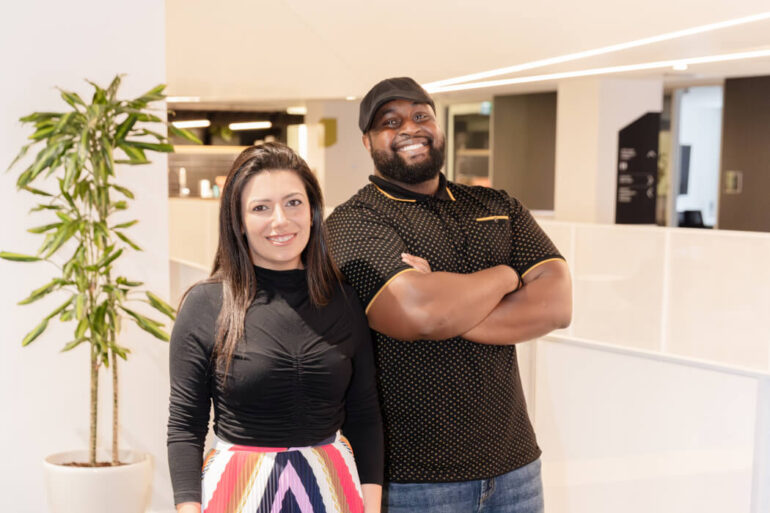Clinical trials can be time-consuming, expensive, and suffer poor success rates. Using artificial intelligence (AI), Montréal-based Simmunome aims to help predict whether drug candidates will succeed or fail in clinical trials.
Simmunome and its team of molecular biology, bioinformatics, AI, and computational neuroscience experts have closed $2 million CAD in pre-seed funding to continue developing and begin commercializing a software solution designed to do just that.
“There is a lot of activity, there are a lot of dollars in this industry, but most importantly, there are human lives at the end of this.”
– Armstrong Murira, Simmunome
While many AI startups focused on pharmaceutical clinical trials have emerged targeting the drug-molecule side of the equation, Simmunome co-founder and CEO Armstrong Murira argued that it has seen fewer players focused on disease biology in the clinical stage of the drug development process, despite the complexity—and opportunity—involved.
“Now, we have the will and I think the computational resources to really start to try and tackle this perspective,” Murira told BetaKit in an interview.
Simmunome’s all-equity pre-seed round, which closed earlier this month, was led by biotech and medtech-focused Theodorus Investment Funds. It saw participation from Fonds d’investissement Eurêka, BKR Capital, Sandpiper Ventures, and ACET Capital. Murira declined to disclose the startup’s valuation. This capital comes in addition to a previous $25,000 simple agreement for future equity (SAFE) investment from Front Row Ventures, and $600,000 in grant funding.
Murira gained a firsthand understanding of the “low success rates and really exorbitant costs” associated with clinical trials while working in the field as a biochemistry and molecular biology PhD. To help address this problem, he founded Simmunome alongside CTO Nardin Nakhla, who holds a PhD in neuroscience.
As Nakhla told BetaKit, most pharmaceutical clinical trials fail. “That’s because biology is very complex, and it’s not very well understood,” she added, noting that an incomplete understanding of diseases plays a role in this.
Enter Simmunome, which hopes to bring more predictability to clinical trials. The startup has developed proprietary computational models designed to help pharma companies and academic labs better understand the biology of Alzheimer’s, melanoma, and other diseases in the fields of oncology, neurodegenerative diseases, and regenerative medicine.
RELATED: Altis Labs closes $7.9 million to evaluate cancer treatments using AI
Via computer, Simmunome customers can simulate whether certain therapeutics will work for certain patients and diseases. Clients can input specific patient and drug data into Simmunome’s software in order to obtain predictions specific to their patients or find patterns or causal bio markers driven from their data. Through this approach, Simmunome hopes to help de-risk clinical trials and reduce the need for testing on animals and humans.
“The [Simmunome] team has developed a unique and innovative approach when it comes to evaluating the probability of a drug’s efficacy, allowing optimization of target selection at the early discovery phase in the clinical value chain,” Theodorus principal Théo Risopoulos said in a statement.
For years, startups have sought to apply AI to the drug discovery and development process, exploring a number of different approaches. Within the space, Murira said, “In very broad terms, there is the drug side and the biology side, and this is a lock and key that will have to work hand in hand.”
Canada currently plays home to a number of other more established tech firms applying AI to drug discovery and development, including AbCellera, Deep Genomics, BenchSci, Altis Labs, as well as Cyclica and Valence Discovery, which were both recently acquired by American biotech Recursion.
RELATED: BenchSci closes $95-million CAD Series D to expand AI drug-discovery platform
Some players in this space have struck out and sought to become pharmaceutical companies themselves. Simmunome has no ambitions to do that: the startup simply hopes to be a service provider to pharma firms, biotech companies, and research institutes doing this sort of work.
Simmunome’s direct competitors include companies using digital twin technology. Citing the size of the industry Simmunome serves and the stakes and dollars at play, Murira believes that there is room for lots of players in this space.
Amid a crowded field, Murira singled out Simmunome’s “multi-omic integration approach” as a differentiator. Multi-omics is an approach to biological analysis that takes into account more than just the genome. By doing this, Simmunome hopes to bring “a more complete understanding to the biological processes that guide health and disease.”
“There is a lot of activity, there are a lot of dollars in this industry, but most importantly, there are human lives at the end of this,” said Murira. “How do we improve those outcomes for the good of humanity?”
Feature image courtesy Simmunome.


